#in way of MACBETH films. one of the best ones is akira kurosawa's throne of blood where its taisho era fuedal japan instead and its samurai
Note
hamlet is my poor little meow meow. hes ny babygirl. my failmale. my wife. my everything. my silly rabbit.
he's a great choice, he's the emo blueprint. what was the moment in hamlet that made u feel this way? him doing sex puns and innuendos towards ophelia's father, or his iconic speech where he contemplates killing himself? there truly are so many possibilities. have u seen any of the multiple film adaptions for hamlet; i could recommend some really good ones. dm if interested lol (but i'll include them in my tags anyways)
#my favorite hamlet adaption is definitely the black and white laurence olivier one but branagh's is the most accurate depiction of him#the branagh film has robin williams in it too#you should watch claire mccarthy's ophelia film too it was seriously godawful but hamlet is a total failmale in that one#god that ophelia movie was rly outta pocket#highly recommend watching the ophelia one with a group of friends and a joint#the almereyda one is a modern adaption where its like succession or whatever tf. i dont watch or care abt succession#HOWEVER#in way of MACBETH films. one of the best ones is akira kurosawa's throne of blood where its taisho era fuedal japan instead and its samurai#actually its probably not the taisho era that one is a bit too recent i think
3 notes
·
View notes
Note
(this is spacekrakens lmao) dude idk anything about like 1950s Japanese cinema, do you have any recommendations? looking for stuff to toss on the watchlist now that I'm a bit burned out on horror (unless you have some horror recs)
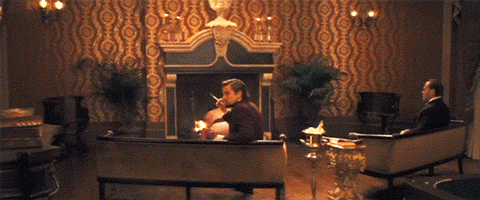
Hey! If you’re curious about Japanese cinema (particularly 1950s), there’s a lot of avenues to explore! Musicals, crime, horror, historical—it all depends on what mood you’re in. (Putting this under a read more because I'm DEFINITELY going to be long posting about this!!!) Hope this is useful to you lol.
(Also noting if anybody wants to add to this list with their own recommendations feel free!!)
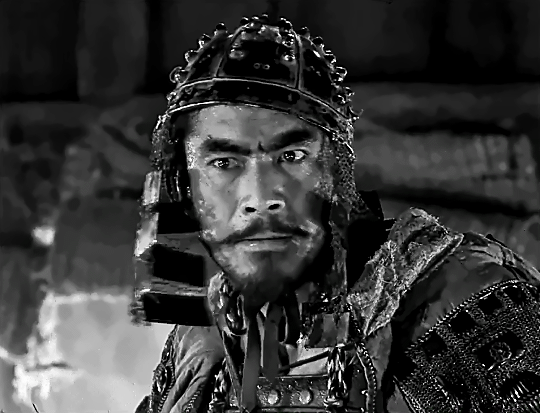
With old school Japanese cinema, I’ll always recommend Akira Kurosawa (obviously). He’s made some of the best Japanese movies (and arguably, the best movies of all time imo) and I feel like his work is a good gateway. It’s readily available on physical media/streaming too.
Specifically ‘50s stuff; Hidden Fortress (1958) is a good adventure flick whose structure was swiped for Star Wars, Throne of Blood (1957) is Japanese Macbeth if you like Shakespeare, and if you don’t mind a longer movie Seven Samurai (1954) includes Toshiro Mifune acting like this;
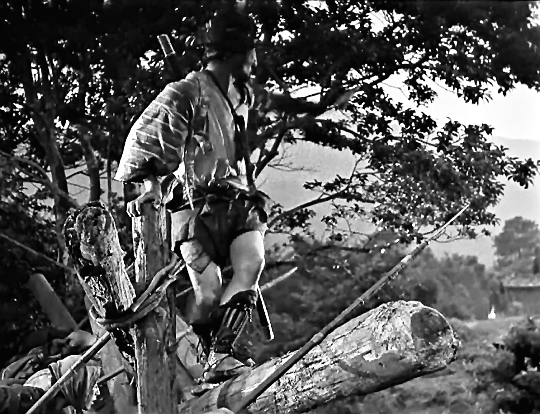
Gotta admit, though—my personal favorites from Kurosawa don’t come from the 1950s; Drunken Angel (1948) and Yojimbo (1961). One has a pathetic gangster as the main lead, the other is just a solid, breezy proto-action film (also has my beloved Unosuke but that's besides the point)
Some personal favorites of mine from the 1950s:
Life of a Horse Trader (1951) is a bittersweet story about a man trying to be a good single father to his son in the backdrop of Hokkaido. He tends not to be great at it. Stars Toshiro Mifune, the most famous face of Japanese cinema and for good reason!
Conflagration/Enjo (1958) is a single Buddhist acolyte’s fall into quiet insanity. Raizo Ichikawa is another amazing actor who I love! Also includes Tatsuya Nakadai who is the GOAT (in my heart).
Godzilla (1954) is AMAZING! If you liked Gozilla Minus One, it took a lot of familiar cues from this movie. It also technically counts as horror, depending on your definition.
Japanese horror from the 1950s:
Ugetsu (1951) (Not one I’ve seen personally, but it’s on Criterion)
The Beast Shall Die (1958) (American Psycho, but in Showa Japan. Tatsuya Nakadai is terrifying in this and absolutely despicable—stylish movie tho!)
Ghost of Yotsuya (1959) (Old-school Japanese ghost story. Honestly, there are so many different versions of this story on film that you can pick which version to watch and go from there—I’m partial to the 1965 version myself, because of the rubber rats and Tatsuya Nakadai playing a crazy person).
The Lady Vampire (1959) is the OG western-style vampire movie from Japan. Plays around with the mythos a lot, but hey our Dracula looks like this;

Misc movies that I think are neat or good gateway movies:
The Samurai Trilogy by Hiroshi Inagaki, which stars Toshiro Mifune as Miyamoto Musashi. Found that people otherwise uninterested in Japanese cinema really enjoyed this!
You Can Succeed, Too (1964) is one of my favorites from the ‘60s, also directed by Eizō Sugawa. A fun satire on the corporate world that's super colorful with catchy songs.
The Sword of Doom (1966) is also another favorite of mine, starring my beloved Tatsuya Nakadai as another bastard man (seriously though Ryunosuke is FASCINATING to me--). Fun gore effects and action scenes!
Kwaidan (1964) is an anthology of Japanese folk tales, labeled a horror film but in that kinda sorta old-school way. Beautifully shot by my favorite Japanese director Masaki Kobayashi (who, if you like this you should seriously check out his other work!)
#thanks for the ask!#akira kurosawa#tatsuya nakadai#toshiro mifune#raizo ichikawa#japan#film#godzilla#hidden fortress#seven samurai#drunken angel#yojimbo#enjo#sword of doom#kwaidan#you can succeed too#samurai trilogy#the lady vampire#ghost of yotsuya#ugetsu#life of a horse trader#throne of blood#ask
59 notes
·
View notes
Note
LWA: I'm circling back to the problem of trying to somehow identify Crowley's Angel-identity from extant Biblical precedents, and some posts from yesterday about novels that have inspired or will inspire aspects of S1 and S2--TALE OF TWO CITIES, PRIDE AND PREJUDICE, and THE CROW ROAD--have accidentally highlighted what's bothering me about this (even though I fell into it myself!).
There are so many ways that novelists, filmmakers, etc. can rework their literary antecedents, and assuming that we can go back to the Biblical (or Miltonic, Dantean, etc.) source to decode what Gaiman is doing rests on assumptions about how Gaiman--and Pratchett and Finnemore--are engaging with other texts. That /is/ something you can do with, for example, Akira Kurosawa's Shakespeare films (THRONE OF BLOOD/MACBETH, THE BAD SLEEP WELL/HAMLET, RAN/KING LEAR), where the films are extensively in conversation with Shakespeare, fundamentally share Shakespeare's plots, inhabit the same tragic mode, and have characters who can be mapped directly onto Shakespeare's. And yet the films /aren't/ Shakespeare, but Shakespeare reinterpreted through Japanese cinematic and theatrical genres (jidaigeki, Noh), cultural and historical referents, and twentieth-century preoccupations. They often signal differences through inversion--the gender-flipped characters in RAN, the silent protagonist in THE BAD SLEEP WELL--and they experiment by pulling threads. How would we reinterpret KING LEAR if Lear had a backstory? What happens if you pull a major character out of HAMLET?
But this is not how GOOD OMENS--the novel, S1, or S2--works with its own antecedents. Instead, it invokes antecedents to fracture them and then shoot off in its own directions; they appear in the text or series to establish expectations that are then abruptly undercut. You can't do an extended reading of GO's "conversation" with THE OMEN, because it isn't having one (in S1, the major points of contact are done with in ep1). Instead, we have THE OMEN banging up against the JUST WILLIAM series, THE SCREWTAPE LETTERS, John Le Carre, the Bible...The genres and modes deliberately don't shake hands. Characters may or may not be parallels, but they are at best partly so and the analogies soon break down. In the series, yes, A TALE OF TWO CITIES inspires the appearance-swap at the end of S1, but it is so wildly different that it doesn't help the reader interpret what GO is doing. (Among other things, Sydney Carton /actually/ dies--obviously!--and Charles Darnay doesn't, meaning that it's a true self-sacrifice; Carton's underlying motivations are different; Darnay is upset by the proposal and effectively forced into it by being knocked unconscious; etc.) It's less a conversation and more a starting-point for play.
Similarly, S2 invokes and plays with PRIDE AND PREJUDICE, but it /isn't/ PRIDE AND PREJUDICE. (This time, PRIDE & PREJUDICE bangs up against Richard Curtis films, the cozy mystery genre, the Hollywood Biblical epic...) If anything, Aziraphale's ball serves as a metafictional warning to /not/ try to force an interpretation of events through P&P's lens. (It's also a bad misreading on Aziraphale's part, since Jane and Bingley fall for each other at the ball, but the protagonists exit it disliking each other!) Aziraphale and Crowley absolutely occupy aspects of Darcy's and Lizzie's roles, including the "both right/both wrong" problem and the relationship meddling (which is the opposite of Darcy's strategy with Bingley), but the series is far more invested in miscommunication as a problem than the novel is. The plots don't track and character parallels break down pretty quickly. It's impossible to maintain a good analogical "fit" between Heaven vs. Hell and wealthy vs. relatively-impoverished gentry (among other things, pursuing the analogy would leave us with Crowley eventually deciding to return to Heaven, which, no). Aziraphale and Crowley are nowhere near the same emotional space that Darcy and Lizzie are during the proposal scene, and while Darcy has not adequately communicated his intentions to Lizzie in the lead-up to his first proposal, the problem /during/ the proposal is that he's being a jerk and she has every right to be aggravated with him, not that they're mutually misunderstanding each other. The stakes, narrative contexts, and mental hang-ups are different. Etc. Presumably Gaiman will invoke and then disrupt THE CROW ROAD in the same way.
So, again, with the Bible. We can't use the Bible to predict anything that will happen in the GO universe because we have no way of knowing what GO will declare to be /wrong/ about the Biblical record. In S1, we discover that it's a Principality guarding the Eastern Gate, and that there's a minor matter of a missing sword; we also find out that the Flood is local and that Crowley felt that Jesus just needed a bit of a vacation break. (If you've read the novel, you also know that Aziraphale is dismissive of Revelation, thanks to John's addiction to shrooms.) In S2, we have the Job minisode, and it would take a really, really long time to break down just how far that minisode departs from the Book of Job (and this ask is already long enough!). The point, as Crowley might say, is that we approach the series with expectations set by the Bible, but then we discover that the series never takes the Biblical narrative as set. It's unpredictable (as Crowley also says).
evening (morning technically, currently at 0050hrs and will probably be done around 0300) LWA, hope you're good!!!✨
this is obviously far more eloquent, nuanced, and empirically evidenced than i could have ever put it, but im going to view this as going some way to being validation for the thought processes on a couple of theories/speculations that have been floating around in the wake of s2. meant kindly, i think the allegorical element of GO can sometimes misconstrued, and fans can sometimes get so caught up in what they believe is the only true inspiration for the story, and miss that it is a work of fiction. it is literally made-up. it stands to reason therefore, and has been demonstrated time and time again, as having been inspired at its core from lots of different places.
there is representation of so many things in GO, and it's truly one of the aspects that i love most about it. it is not representative of any one set rhetoric. specifically about your example of who crowley was before the fall; this caused so much underlying discourse that i fully appreciated and considered perfectly valid. crowley was described by neil as a jewish-coded character insomuch that he asked questions (tbh by extension from that the whole story could be described similarly?), and then, as ive since learned, a lot of the angelic names mentioned are hebrew in origin. since having a plethora of asks flood me contradicting that crowley cannot or should not have been an angel of christian origin, or otherwise, ive educated myself more. but im not going to go back on what i myself have speculated on because it is a story, and it can take inspiration, and rework that inspiration in kind, from anywhere. that, i think, sometimes gets missed. ive usually speculated and analysed based on where the narrative, to my mind, has been heading, taking cues from what we've seen so far, and then researched off the back of it what might fit or would support it - not the other way around.
religious representation is important. speaking personally- being someone non-religious and raised largely secular (as said many times) i will never fully understand what it means to have that representation portrayed in popular media... because how on earth could i begin to? but i would like to say i understand emotion and how people think, and i can understand why representation is important to people. that is valid, in every respect. but GO is not a reworked version of any one biblical text, as you said. inspirations not shaking hands, but flitting around each other in a dance. it pokes holes at, reimagines, and validates as well as invalidates elements of multiple religious texts and teachings (one of my favourite and imo funniest book lines was the mushrooms recollection, was gutted it didn't make the show in full!)
again, this is part of why i love it - because whilst these different allegories provide the backdrop to the story, it is not the story. the reason why the story is so important to me is because it is an examination of the human condition through the eyes of beings that are not human. the story could be told from the pov of a human-form pot plant and reach the same kind of conclusions, but the religious inspiration gives the story more consistent context, dichotomy and insight, more depth and philosophy. and it's much more entertaining. but yes - let the narrative be inspired by anything; bits and pieces from this, pinches and dashes from that... it creates a story that is so arguably unique that way, frames its own questions and problems, and remains to true to being a work of fiction - set to inspire and challenge in kind on to other present and future works - and so on and on the cog turns - isn't that the point?
GO is not the only religious-inspired work that ive loved for these reasons; favourite book (no offence to anyone by daring to type this sentence as a GO blog; it's sentimental to me) is andrew davidson's the gargoyle. it very scrupulously follows, at times, elements of dante's divine comedy and makes overt references to it given its a key part of the story, but it's manifestly allegorical too. but the best part of the story is how it interprets religion's often tumultuous relationship with mental health, love being flawed and discriminatory, and the concept of salvation. again, religious imagery and inspiration as the backdrop, human condition being the narrative.
i haven't really remarked on any else that you've mentioned, LWA, which is par for the course with me, so going to speedrun slightly.
P&P: when i watched s2 i must admit i was almost surprised that this work had so much weight, because i felt it had more relation to other austen works (emma and persuasion particularly) but then i remembered that was the Whole Point
Kurosawa: will admit that i haven't seen these but based on what im assuming is your recommendation i will duly add to the watchlist (seen Kagemusha, but that's it for my foray into his works!)
Le Carré: ah, im so glad you said this! when ive been thinking idly about the corruption in heaven and the risk in looking back on it with the metaphorical rose-tinted glasses, this is the same feeling as when i read his work - bits from TTSS, and constant gardener, but TLGW especially in my mind... not sure if you were referring to these works in particular and in this context, but huge fan of Le Carré and happy to see it mentioned!!!
richard curtis: i... yeah. this was a revelation for me. enough said.
ultimately im so excited about the unpredictable; i love speculating, and whilst it's fun to have gotten something right (s2 was not a good track record for me, the only things i got that were even a smidgeon near the truth were half-arsed shitposts and if that doesn't humble a girl, nothing will), i want to be taken aback by where the narrative has gone, the dilemmas that have been raised, dialogue and exposition choices... i want to be wrong, because that's infinitely more fun!
(0220 - not bad)✨
#good omens#this was a wild ride#not a shitpost but its good omens babyyyy#the legend of the longwinded anon✨#ask#and now i sleep: goodnight world#i cant fathom why LWA keeps coming back but im not gonna complain#i take so long to answer these bc i write a bit#reread what LWA has said#ponder the universe for ten minutes#then carry on typing#rinse and repeat
10 notes
·
View notes
Photo
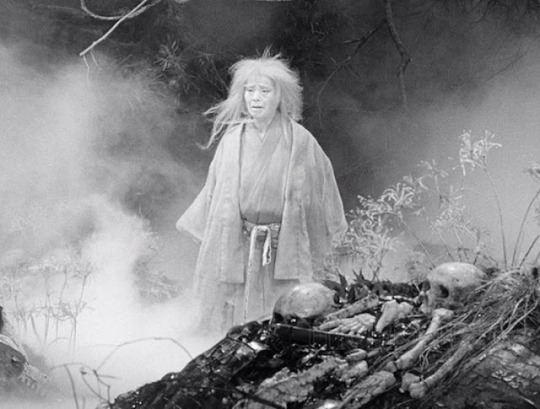
Chieko Naniwa in Throne of Blood (Akira Kurosawa, 1957)
Cast: Toshiro Mifune, Isuzu Yamada, Takashi Shimura, Akira Kubo, Hiroshi Tachikawa, Minoru Chiaki, Takamaru Sazaki, Chieko Naniwa. Screenplay: Hideo Oguni, Shinobu Hashimoto, Ryuzo Kikushima, Akira Kurosawa, based on a play by William Shakespeare. Cinematography: Asakazu Nakai. Production design: Yoshiro Muraki. Music: Masaru Sato.
To call Throne of Blood the best film version of Shakespeare's Macbeth, as some have done, does a disservice to those filmmakers who have wrangled with the difficult beauty of Shakespeare's language, like Orson Welles in 1948 or Justin Kurzel (who pretty much threw the language out of consideration) in 2015 or Joel Coen in 2021. But it also distorts Akira Kurosawa's achievement, which is not to provide us with a kind of Japanese analog to Macbeth, but to grasp the essence of Shakespeare's tormented vision of ambition and the limits of civilization. Moving the action from medieval Scotland to medieval Japan could be just as gimmicky as staging Shakespeare's play in the Old West or outer space, which some avant-garde directors have probably already done, except that Kurosawa has the skill to make Throne of Blood stand on its own, even for those who have no knowledge of Shakespeare. It's an action film, a ghost story, and a portrait of a marriage -- the contrast of the blustering Washizu and his icy spouse is beautifully handled by Toshiro Mifune and Isuzu Yamada. And the final assault on Washizu is one of the most exciting -- and dangerous -- stunts ever pulled off by a director and a movie star, involving sharpshooting archers and careful choreography as Mifune battles his way through a forest of real arrows. We miss the language, of course -- Macbeth contains some of Shakespeare's most gorgeous speeches -- but Kurosawa gives us many compensations.
1 note
·
View note
Text
Smokey brand Select: Violent Delights
I was waxing nostalgic the other day about the Nineties version of Romeo and Juliet, about how much i actually like certain aspects of that film and absolutely abhor others. It got me pondering how much i unabashedly enjoy Shakespeare and many of the big screen adaption of “his” work. These things run the gambit of genre and i think it’s a ripe subject to kind of pick from. I mean, there are just so many ways to adapt this cats catalog and i figure i might as well pick out my favorites.
10. Forbidden Planet
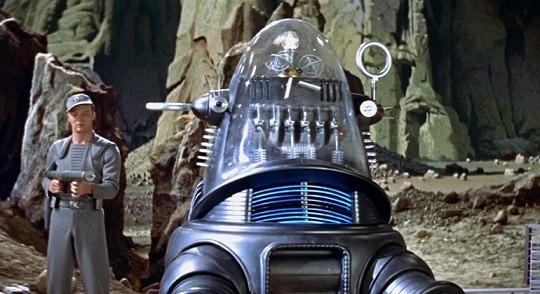
This movie ain’t great. It;s not. But love it anyway. I have a soft spot for those old timey, Fifties, monster flicks and Forbidden Planet is one of the best. It’s campy schlock, don’t misunderstand, but i used to watch this thing late night, right before regular TV went of air. It’s the worst, but i appreciate the fact that it’s true to its time and is one of the very, very, few adaptions of The Tempest. That play never gets the love it deserves.
9. Ophelia

Ophelia is Hamlet from the perspective of his wife, Ophelia. It’s an interesting take on the Hamlet narrative, not really one of would gravitate toward if not for this ridiculously stellar cast, particularly Daisy Ridley. She kills the role as Ophelia and kind of makes you want to see where this version of the story goes. I definitely prefer the tragedy of Hamlet over this take on the narrative, but Ophelia definitely stands on it’s own and is totally worth a watch.
8. She’s the Man

Listen, this is a guilty pleasure. She’s the Man ain’t great. It’s actually pretty terrible, but i love it for how earnest this film is in telling it’s story. An adaption of Shakespeare’s gender-swap farce, Twelfth Night, it’s one of the few, comedic, plays that got the big screen treatment and Amanda Bynes carries this whole goddamn movie as this version’s Viola. I actually miss when Bynes wasn’t crazy and just made funny, endearing, sh*t like this. I mean, who doesn’t love Big Fat Liar, you know?
7. Scotland, PA
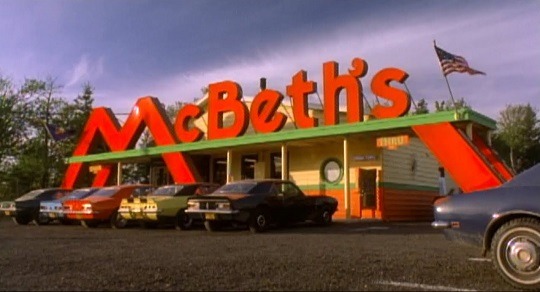
This is probably the most creative take on a Shakespeare property i have ever seen in my entire life. This is MacBeth, told as black comedy a la Fargo, set in a 1975 Pennsylvania fast food restaurant. Yeah. I’m not even going to go any further into it. This was one of the most ridiculous viewing experiences i’ve ever had and i loved very second of it.
6. Hamlet
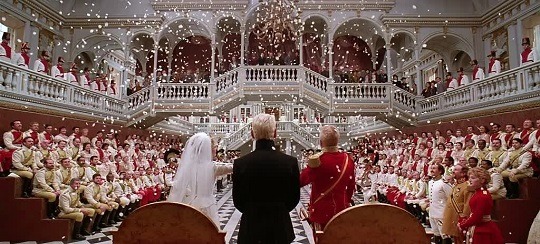
I feel like this is a cheat, like there would be something different here. I actually pondered the Lion King because, technically, that’s a Hamlet adaption but, the more i thought about it, the more this one had to go on the list. It’s just that good. The1996 version of Hamlet, directed, screenplay written by, and starring Kenneth Branagh, is a whole ass classic. It’s a straight forward interpretation of the original play only updated with a nineteenth century aesthetic, which fits the narrative surprisingly well. This version of Hamlet is high f*cking art, man. It’s gorgeous in every way. The score, the costumes, the sets, the colors; All of it is a legitimate feast for the eyes. That said, this motherf*cker is four hours long so, you know, understand that sh*t going in. It;s worth, don’t misunderstand, it’s just real long in the tooth, man.
5. My Own Private Idaho
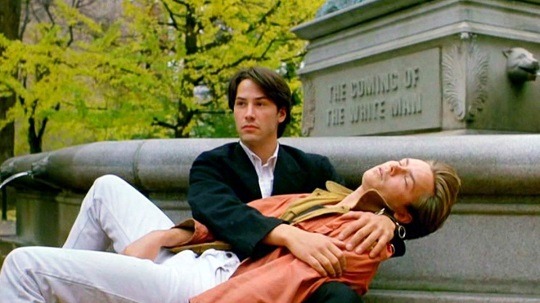
Idaho is probably the bleakest film on this list. Gus Van Zant is pretty great at capturing the sordid, cruel, reality of the human experiences which makes his adaption of Shakespeare’s Henry tetralogy. I don’t much go for European history for reasons, but i dug this flick and how it kind of mutes all of the glamour and Victorian nonsense for a more guttural, street level, desperation. My Own Private Idaho is not an easy watch I t can be incredibly difficult to get through at times but that doesn’t mean it’s not a brilliant film. that doesn’t mean you shouldn’t take on this challenge. The performance that River Phoenix gives, alone, is enough for admission. As dope as Joaquin is at his craft, River was definitely the superior talent and that is no more apparent than in this movie.
4. 10 Things I Hate About You
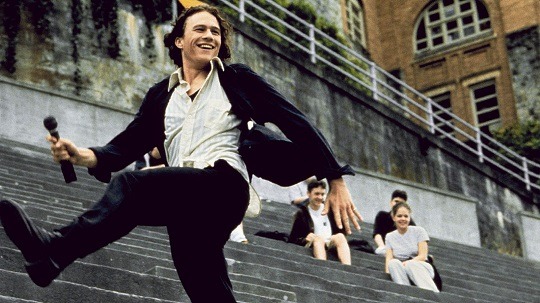
The Taming of the Shrew is actually one of my favorite Shakespeare plays and this film, 10 Things I Hate About You, is one of the best versions of that narrative. This film is f*cking hilarious. It’s outstanding and unique and never strays from the heart of it’s inspiration. Plus, i mean, it’s got a young Heath Ledger just stealing all of the scenes. When you watch him in this, you know dude has all of the talent. This film is why i was completely okay with him as Joker when they announced it. Everyone else lost their sh*t but me? I remembered Ledger’s Patrick Verona and knew the role was in good hands.
3. Throne of Blood

If i had to choose a favorite Shakespeare story, it’s definitely MacBeth. I love that sh*t. There’s intrigue, betrayal, violence, lust, and even a little magic; Everything you need to build an intriguing plot. Take the basic narrative and funnel it through a true master of film like Akira Kurosawa and you get a real classic like Throne of Blood. This is an old one, it dropped back in ‘57, but it’s worth a watch. Kurosawa was a true visionary in his craft and the way he was able to, not only adapt but elevate the source material? F*cking amazing, man. Y’all should watch more Akira Kurosawa, man. He’s one of the most influential filmmakers ever to do it and it’s for good reason. Also, f*cking more MacBeth adaptions, please? There are only, like, six. The f*ck, yo?
2. Romeo + Juliet

I’ve already spoken about my love for this decidedly Nineties take on that classic, uncomfortably problematic, laughably toxic, romance that’s just rife with all of the tragedy and tropes. Why the double-dip? Because i love it THAT much! Tybalt, Mercutio, the aesthetic, that soundtrack; F*cking chef kiss, bro! If you’ve never seen this version of Romeo and Juliet, you don't love yourself enough.
1. Ex Machina
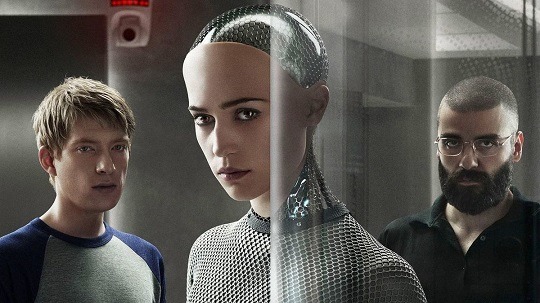
Yeah, that’s right, this f*cking masterpiece of existential, cyberpunk dread, is based on Shakespeare, too! Motherf*ckers wouldn’t know because it’s kind of a deep cut but a lot of the themes from The Tempest, actually my second favorite Shakespeare outing, ring true to Garland’s narrative. I mean, do i really have to explain why i love this movie so much? Actually, i have. Repeatedly. My praise for this movie is rife throughout the backlog of this blog. This thing has made multiple of the Select lists because it’s so f*cking great. Obviously, it’s my favorite adaption but, more than that, like Throne of Blood, it’s just a great f*cking film by itself.
Honorable Mentions: The Lion King, Titus (1999), A Midsummer Night's Dream (1999), Men of Respect, Richard III (1995), Much Ado About Nothing (1993), Ran, MacBeth (2015), Coriolanus (2011), Get Over It
2 notes
·
View notes
Text
Smokey brand Select: Violent Delights
I was waxing nostalgic the other day about the Nineties version of Romeo and Juliet, about how much i actually like certain aspects of that film and absolutely abhor others. It got me pondering how much i unabashedly enjoy Shakespeare and many of the big screen adaption of “his” work. These things run the gambit of genre and i think it’s a ripe subject to kind of pick from. I mean, there are just so many ways to adapt this cats catalog and i figure i might as well pick out my favorites.
10. Forbidden Planet
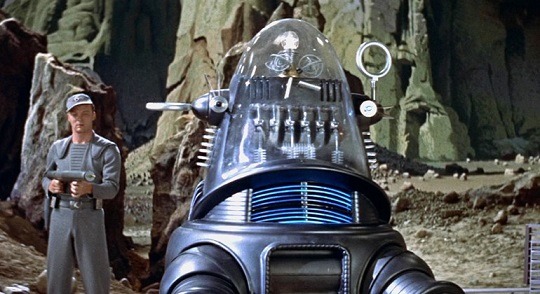
This movie ain’t great. It;s not. But love it anyway. I have a soft spot for those old timey, Fifties, monster flicks and Forbidden Planet is one of the best. It’s campy schlock, don’t misunderstand, but i used to watch this thing late night, right before regular TV went of air. It’s the worst, but i appreciate the fact that it’s true to its time and is one of the very, very, few adaptions of The Tempest. That play never gets the love it deserves.
9. Ophelia

Ophelia is Hamlet from the perspective of his wife, Ophelia. It’s an interesting take on the Hamlet narrative, not really one of would gravitate toward if not for this ridiculously stellar cast, particularly Daisy Ridley. She kills the role as Ophelia and kind of makes you want to see where this version of the story goes. I definitely prefer the tragedy of Hamlet over this take on the narrative, but Ophelia definitely stands on it’s own and is totally worth a watch.
8. She’s the Man

Listen, this is a guilty pleasure. She’s the Man ain’t great. It;s actually pretty terrible, but i love it for how earnest this film is in telling it’s story. An adaption of Shakespeare’s gender-swap farce, Twelfth Night, it’s one of the few, comedic, plays that got the big screen treatment and Amanda Bynes carries this whole goddamn movie as this version’s Viola. I actually miss when Bynes wasn’t crazy and just made funny, endearing, sh*t like this. I mean, who doesn’t love Big Fat Liar, you know?
7. Scotland, PA
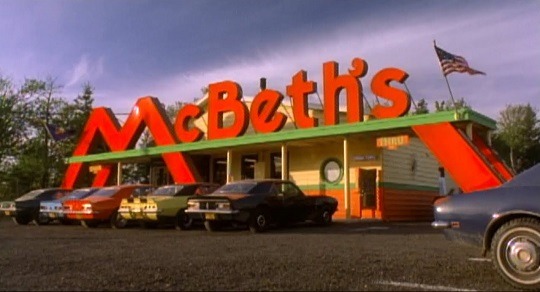
This is probably the most creative take on a Shakespeare property i have ever seen in my entire life. This is MacBeth, told as black comedy a la Fargo, set in a 1975 Pennsylvania fast food restaurant. Yeah. I’m not even going to go any further into it. This was one of the most ridiculous viewing experiences i’ve ever had and i loved very second of it.
6. Hamlet
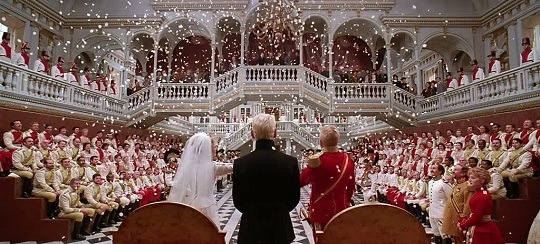
I feel like this is a cheat, like there would be something different here. I actually pondered the Lion King because, technically, that’s a Hamlet adaption but, the more i thought about it, the more this one had to go on the list. It’s just that good. The 1996 version of Hamlet, directed, screenplay written by, and starring Kenneth Branagh, is a whole ass classic. It’s a straight forward interpretation of the original play only updated with a nineteenth century aesthetic, which fits the narrative surprisingly well. This version of Hamlet is high f*cking art, man. It’s gorgeous in every way. The score, the costumes, the sets, the colors; All of it is a legitimate feast for the eyes. That said, this motherf*cker is four hours long so, you know, understand that sh*t going in. It;s worth, don’t misunderstand, it’s just real long in the tooth, man.
5. My Own Private Idaho
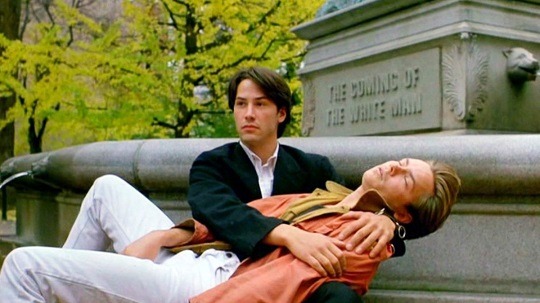
Idaho is probably the bleakest film on this list. Gus Van Zant is pretty great at capturing the sordid, cruel, reality of the human experiences which makes his adaption of Shakespeare’s Henry tetralogy. I don’t much go for European history for reasons, but i dug this flick and how it kind of mutes all of the glamour and Victorian nonsense for a more guttural, street level, desperation. My Own Private Idaho is not an easy watch I t can be incredibly difficult to get through at times but that doesn’t mean it’s not a brilliant film. that doesn’t mean you shouldn’t take on this challenge. The performance that River Phoenix gives, alone, is enough for admission. As dope as Joaquin is at his craft, River was definitely the superior talent and that is no more apparent than in this movie.
4. 10 Things I Hate About You
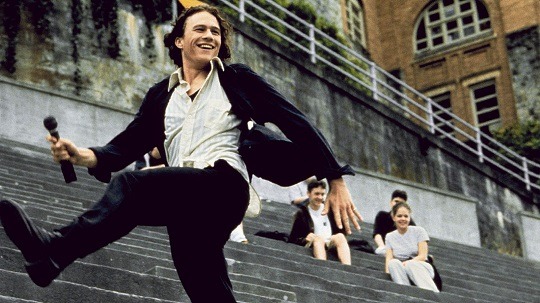
The Taming of the Shrew is actually one of my favorite Shakespeare plays and this film, 10 Things I Hate About You, is one of the best versions of that narrative. This film is f*cking hilarious. It’s outstanding and unique and never strays from the heart of it’s inspiration. Plus, i mean, it’s got a young Heath Ledger just stealing all of the scenes. When you watch him in this, you know dude has all of the talent. This film is why i was completely okay with him as Joker when they announced it. Everyone else lost their sh*t but me? I remembered Ledger’s Patrick Verona and knew the role was in good hands.
3. Throne of Blood

If i had to choose a favorite Shakespeare story, it’s definitely MacBeth. I love that sh*t. There’s intrigue, betrayal, violence, lust, and even a little magic; Everything you need to build an intriguing plot. Take the basic narrative and funnel it through a true master of film like Akira Kurosawa and you get a real classic like Throne of Blood. This is an old one, it dropped back in ‘57, but it’s worth a watch. Kurosawa was a true visionary in his craft and the way he was able to, not only adapt but elevate the source material? F*cking amazing, man. Y’all should watch more Akira Kurosawa, man. He’s one of the most influential filmmakers ever to do it and it’s for good reason. Also, f*cking more MacBeth adaptions, please? There are only, like, six. The f*ck, yo?
2. Romeo + Juliet
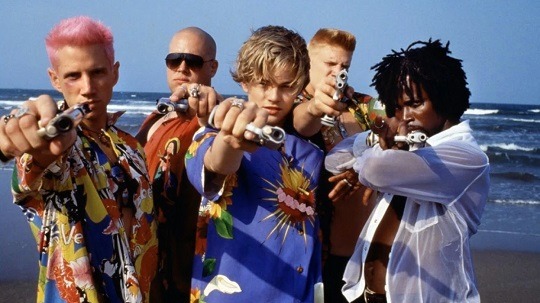
I’ve already spoken about my love for this decidedly Nineties take on that classic, uncomfortably problematic, laughably toxic, romance that’s just rife with all of the tragedy and tropes. Why the double-dip? Because i love it THAT much! Tybalt, Mercutio, the aesthetic, that soundtrack; F*cking chef kiss, bro! If you’ve never seen this version of Romeo and Juliet, you don't love yourself enough.
1. Ex Machina
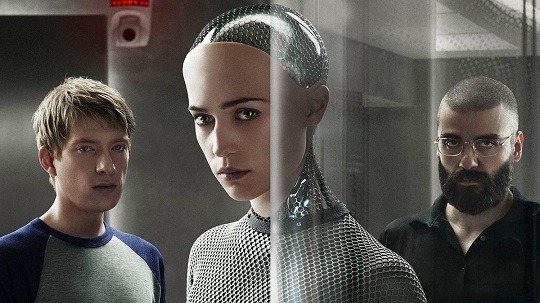
Yeah, that’s right, this f*cking masterpiece of existential, cyberpunk dread, is based on Shakespeare, too! Motherf*ckers wouldn’t know because it’s kind of a deep cut but a lot of the themes from The Tempest, actually my second favorite Shakespeare outing, ring true to Garland’s narrative. I mean, do i really have to explain why i love this movie so much? Actually, i have. Repeatedly. My praise for this movie is rife throughout the backlog of this blog. This thing has made multiple of the Select lists because it’s so f*cking great. Obviously, it’s my favorite adaption but, more than that, like Throne of Blood, it’s just a great f*cking film by itself.
Honorable Mentions: The Lion King, Titus (1999), A Midsummer Night's Dream (1999), Men of Respect, Richard III (1995), Much Ado About Nothing (1993), Ran, MacBeth (2015), Coriolanus (2011), Get Over It
0 notes
Text
Ghost of Tsushima: Essential Kurosawa Samurai Movies to Watch Before the Game
https://ift.tt/eA8V8J
Ghost of Tsushima‘s developers at Sucker Punch have been very explicit about the ways the samurai films of legendary Japanese director Akira Kurosawa have influenced their game. The PS4 exclusive even features a “Kurosawa Mode” that allows you to apply a stylish black-and-white filter to the experience, recreating the somber mood and film grain of the director’s work.
Anyone who tells a modern samurai story owes some kind of debt to Kurosawa. He may not have been the first director to tell a samurai story via film and his legacy as one of the greatest directors of all-time may have been secured even if he hadn’t directed a frame of a samurai adventure. What a shame it would have been to live in that world, though.
Kurosawa’s samurai films aren’t just some of the best samurai adventures told in any medium, they’re on the shortlist of the best movies ever made. So whether you want to hype yourself up for Ghost of Tsushima or you just want to experience some of the finest pieces of filmmaking ever made, these are the Kurosawa samurai movies you need to watch.
Rashomon
The rape of a woman and the murder of her husband triggers an investigation based on the recollections of four people who possess conflicting memories of the events which led to the horrific crimes. What follows is the search for truth in a world where even the liars may not be aware of their bias.
While Rashomon features samurai and a bit of swordplay, it’s probably not exactly what you think of when you think of a Kurosawa samurai film. It lacks much of the action and setpieces that typically define the director’s most exciting outings. That means that it’s also likely the Kurosawa samurai film that has the least direct influence on Ghost of Tsushima.
Then again, Rashomon offered such a fresh take on storytelling and perspective that nearly every piece of fiction which followed its release has been influenced by it in some way. Rashomon not only pioneered a new type of narrative device called the Rashomon effect — conflicting accounts of an event by several eyewitnesses — but it taught viewers to consider the potential influence of the unreliable narrator on their perception of a story.
Seven Samurai
This 1954 film tells the story of a group of villagers who recruit seven rōnin to protect their homes from bandits. The samurai not only contend with the bandits but the discourse within their own ranks as well as the villagers who begin to wonder whether they’ve made a mistake by hiring mercenaries.
Even if you’ve never seen Seven Samurai, we’re willing to bet that you’re familiar with it. Not only is it regularly referred to as a major cinematic achievement, but countless movies have borrowed filmmaking and storytelling elements from this masterpiece. Other beloved movies, most notably The Magnificent Seven, are even just straight-up remakes of Seven Samurai. Even The Mandalorian paid homage to Seven Samurai in its first season.
Considering that Seven Samurai has impacted the works of many great directors who have emerged since its release, it’s hardly a surprise to hear that Ghost of Tsushima‘s directors consider Seven Samurai to be one of the most important influences on their game. When you picture samurai, there’s a good chance you’re picturing this film.
Throne of Blood
In Throne of Blood, two samurai return from battle only to be met by a spirit who predicts their future. When the spirits predictions come true, the wife of one of the samurai encourages him to murder their lord and take his place as ruler of their land.
In other words, Throne of Blood is a samurai-themed remake of William Shakespeare’s Macbeth. There are many who even consider it to be the finest film adaptation of Macbeth despite the fact that Throne of Blood doesn’t share that play’s name.
Excellent plot aside, Throne of Blood is arguably most famous for its incredible visuals. The thick fog that weighs heavy on the movie’s setting not only perfectly captures the protagonists’ dangerous desire to see the road ahead but it helps set the stage for climactic battles and scenes which border on horror.
The Hidden Fortress
This 1958 film follows two peasants who agree to escort a man and woman through dangerous territory. What they don’t know is that the man and woman are actually a general and his princess and they’re being hunted by dangerous enemy forces.
Perhaps best known as the inspiration for Star Wars, The Hidden Fortress is one of those films you may feel like you’ve seen without having actually sat down to watch it. A few familiarities aside, Hidden Fortress stands alone among Kurosawa’s other samurai (or samurai influenced) films due to its incredible sense of adventure.
The Hidden Fortress is an excellent adventure that perhaps focuses a bit less on character development than some of Kurosawa’s other films but more than makes up for it with a story that reminds us why we love movies in the first place.
Yojimbo
A samurai wanders into a town where two competing crime lords vie for his services. No, that’s not the start of an old joke. It’s the basic premise behind one of the greatest samurai films ever made. You may also know it as the premise of classic Spaghetti Western flick, A Fistful of Dollars.
While the Clint Eastwood-led Yojimbo adaptation successfully translates many of this story’s elements to the Wild West, there are certain qualities in Yojimbo which are unique to samurai mythology and culture. This tightly told adventure focuses on the perception of power that surrounds the wandering warrior as well as the greed that plagues men regardless of their station.
Ghost of Tsushima’s open-world setting will be filled with side missions to complete. Some of these missions will undoubtedly pit you as a samurai for hire in situations not unlike those found in Yojimbo.
Sanjuro
Originally conceived as an adaptation of the Shūgorō Yamamoto novel, Hibi Heian, Sanjuro was re-written to incorporate Yojimbo’s protagonist following the success of that film.
Sanjuro follows the adventures of the rōnin from Yojimbo as he tries to help a group of young samurai who suspect that their lord chamberlain is corrupt. What follows is a complex and fascinating tale that sees the young samurai and the rōnin battle their enemies while struggling to come to terms with their roles within their world and society at large.
Ghost of Tsushima’s directors cited Sanjuro as one of their biggest influences, and it’s not hard to see why. Not only does Sanjuro find Kurosawa at his most reflective in terms of the morally ambiguous mystique of the samurai, but it may be his most stylish samurai film. The film’s final battle and climatic duel are often cited as two of the most influential pieces of samurai action ever committed to film.
Kagemusha
A thief is recruited to serve as the double of an elderly warlord in order to help confuse potential assassins and other rivals. When the warlord dies, his top generals agree to have the thief stay on as ruler. Soon, an attack from a rival clan forces the thief to become a true leader and warrior.
While Ghost of Tsushima’s appropriately named Kurosawa mode focuses on the director’s legendary black and white visuals, Kagemusha proves that the director’s legendary eye for cinematic style and the romanticism of the feudalism era isn’t limited to a monochrome point of view. In fact, a memorable nightmare sequence in this film reveals that he had a surrealist side that required a full spectrum of color to fully showcase.
Kagemusha also features some of the most impressive large-scale battles ever seen in a Kurosawa samurai film. It’s one of those films that shows the director’s truly special ability to combine the intimate and the epic even as he sets a feast for the eyes.
Ran
A dying warlord decides to relinquish power and divide his extensive kingdom among his three sons. But when the sons begin to fight over their lands, it becomes clear to the warlord that he may be witnessing the dying days of his empire and family. Like Throne of Blood, Ran is essentially a remake of a William Shakespeare story. This time, it’s King Lear.
Released in 1985, Ran is often described as Kurosawa’s last epic. Like his previous samurai movies, much of the joy of watching Ran comes from watching Kurosawa in complete control of his craft, even as the scope of the tale grows and grows.
So far as Ghost of Tsushima goes, it’s certainly interesting to hear that its directors will be using wind as both an environmental building block and a narrative device designed to organically point you in the right direction. While wind is present in many Kurosawa films, its essentially a featured player in Ran where bursts of wind emphasize the chaos of a rapidly changing world.
Ghost of Tsushima is out on July 17 for the PlayStation 4.
The post Ghost of Tsushima: Essential Kurosawa Samurai Movies to Watch Before the Game appeared first on Den of Geek.
from Den of Geek https://ift.tt/3iZXWG8
1 note
·
View note
Text
Samurai Films
One genre of Japanese cinema that I have always loved is samurai or sometimes referred to as sword fighting movies. These types of movies usually revolve around some hero that has incredible sword skills. It has a very similar to western cowboy movies. The samurai genre started out as more dramatic in nature. Then post World War 2 have become a lot more action based. The characters have also become darker and more violent characters. the characters are portraying psychological or physically scared warriors usually as the main character. The setting for this genre of movies typically takes place between the time of 1600 – 1868. You usually have these movies portraying the end of the way of the samurai’s life. You will learn about their past life then where they have ended up. One big theme for some of these movies is master less ronin which is a samurai dealing with their status as society constantly changes. These types of films were constantly being made into the early 1970s. Then there was just so many films of this genre it became oversaturated. You also had most of the big actors of the time getting older so they could no longer play the roles.
Some prominent directors of this genre include Daisuke Ito and Masahiro Makino. These two directors helped develop this genre in the silent and prewar eras of movies. There is Akira Kurosawa who has directed films that are some of the best-known samurai films in the west. These include Seven Samurai which is about the story of a village of farmers that hire seven ronin to combat bandits who will return after harvest to steal the crops. A ronin is a samurai that has no master. This came out in 1954 and is one of my personal favorites for the Japanese samurai genre. The movie does a great job teaching us about the ronin as a character. Also shows how helpless the peasants were. You can see how the two classes are very different. Kurosawa has also directed Rashomon, Throne of blood and Yojimbo. Akira Kurosawa worked closely with Toshiro Mifune one of the most popular actors in japan. The Throne of Blood was even based off one of William Shakespeare works Macbeth. This just shows that other works can always affect each other and bring out new amazing things.

Akira Kurosawa

Seven Samurai
https://www.youtube.com/watch?v=GF5U83UIX1o
You have in recent times the movie The Last Samurai whose story loosely follows the true historical accounts of French officer Jules Burnet assisting Japanese samurai in rebellion against the Emperor. You have some of these samurai movies being remade in a western context, these include Sergio Leones’s A fistful of Dollars and Walter Hill’s Last Man Standing are both remakes of the previous film I mentioned Yojimbo. You have Clint Eastwoods man with no name character modeled loosely off Mifune’s wandering ronin character that is in so many film of the samurai genre. Seven Samurai has even been remade as a western and a science fiction context film. These movies have been very influence and just great to watch. The genre may have slowed down but will never die. At least for ne I can always watch a good samurai movie and find it very enjoyable.

0 notes
Text
March 23rd - On this Day ...
... in 1910, a boy was born in Tokyo as the youngest of eight children of an Army School directer and a merchants’ daughter. His father encouraged physical exercise with his children, but also watching western movies. The boy became interested in movies, theater and the circus, and also learned calligraphy and swordsmanship. After school, he developed interest in being a painter, but decided against it because he thought the art scene was too political. Despite having no previous experience and writing a sarcastic application essay, he got a job as an assistant film director in 1936 and climbed up the ranks quickly, working as a scriptwriter on the side. Over the course of his 57-year career starting in 1942, he directed 30 movies - critically acclaimed, considered troublesome by the censorship office, and loved by scholars to this day. Responsible for much of the Western world’s recognition of Japanese cinema, such a short post can in no way do him justice. His wish to die while shooting a movie did not come true; instead, he succumbed after a stroke and had not worked as a director for three years due to breaking his spine and being confined to a wheelchair. After his death on September 6th, 1998, he was named “Asian of the Century”.
That boy is Akira Kurosawa, director of “Throne of Blood”, one of the best “Macbeth” movie adaptations ever.
0 notes